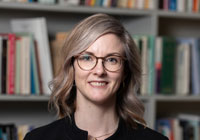
Photo credits:
Johan Wahlgren
Linn Holmberg
Pro Futura Scientia Fellow, SCAS.
Associate Professor of History of Ideas, Stockholm University
Linn Holmberg earned her PhD in History of Science and Ideas from Umeå University in 2014. Her
dissertation, The Forgotten Encyclopedia, received the Royal Swedish Academy of Letters, History
and Antiquities’ award for prize-worthy dissertations in 2015 as well as Johan Nordström’s and
Sten Lindroth’s prize for scholarly excellence in 2016. She was appointed to the Pro Futura Scientia
Programme in 2019. During 2023–2024, she was a visiting fellow at CRASSH and Clare Hall at the
University of
Cambridge.
Holmberg’s research focuses on information management and concepts of knowledge in early modern
Europe. She is especially interested in the emergence of the alphabetically organized reference-work and
its role in transforming and democratizing knowledge. Her publications include The Maurists’ Unfinished
Encyclopedia (2017); Stranded Encyclopedias, 1700–2000 (2021), co-edited with Maria Simonsen;
Konsten att kontextualisera (2022), co-edited with Staffan Bergwik & Karin Dirke; ‘Right and Wrong
Ways of Knowing: The Dictionary Craze and Conflicts of Learning in Eighteenth-Century Europe’, 1700-
tal
: Nordic Journal for Eighteenth-Century Studies (2023).
At SCAS, Holmberg will work on a monograph devoted to the eighteenth-century ‘Dictionary Craze’.
The book studies the reception and cultural impact of the alphabetically-organized reference-work as a
new information technology during the time of its ‘big break’ on European book markets. By analyzing
accounts in twenty learned journals – printed 1665–1789 in France, England, Germany, the Dutch republic,
and Sweden – Holmberg charts out the intellectual debates following the genre’s explosive rise in popularity,
and above all, the fears and hopes that it raised about knowledge and learning. The result is a recontextua-
lization and reconsideration of the dictionary genre’s impact on eighteenth–century society and role in the
Enlightenment movement.
Linn Holmberg is in residence at the Collegium in the autumn of 2024.
This information is accurate as of the academic year 2024-25.






